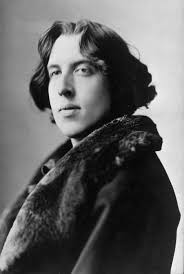The Picture of Dorian Gray Page #25
The Picture of Dorian Gray is a Gothic and philosophical novel by Oscar Wilde, first published complete in the July 1890 issue of Lippincott's Monthly Magazine. Fearing the story was indecent, prior to publication the magazine's editor deleted roughly five hundred words without Wilde's knowledge.
The girl grew white, and trembled. She clenched her hands together, and her voice seemed to catch in her throat. "You are not serious, Dorian?" she murmured. "You are acting." "Acting! I leave that to you. You do it so well," he answered bitterly. She rose from her knees and, with a piteous expression of pain in her face, came across the room to him. She put her hand upon his arm and looked into his eyes. He thrust her back. "Don't touch me!" he cried. A low moan broke from her, and she flung herself at his feet and lay there like a trampled flower. "Dorian, Dorian, don't leave me!" she whispered. "I am so sorry I didn't act well. I was thinking of you all the time. But I will try--indeed, I will try. It came so suddenly across me, my love for you. I think I should never have known it if you had not kissed me--if we had not kissed each other. Kiss me again, my love. Don't go away from me. I couldn't bear it. Oh! don't go away from me. My brother ... No; never mind. He didn't mean it. He was in jest.... But you, oh! can't you forgive me for to-night? I will work so hard and try to improve. Don't be cruel to me, because I love you better than anything in the world. After all, it is only once that I have not pleased you. But you are quite right, Dorian. I should have shown myself more of an artist. It was foolish of me, and yet I couldn't help it. Oh, don't leave me, don't leave me." A fit of passionate sobbing choked her. She crouched on the floor like a wounded thing, and Dorian Gray, with his beautiful eyes, looked down at her, and his chiselled lips curled in exquisite disdain. There is always something ridiculous about the emotions of people whom one has ceased to love. Sibyl Vane seemed to him to be absurdly melodramatic. Her tears and sobs annoyed him. "I am going," he said at last in his calm clear voice. "I don't wish to be unkind, but I can't see you again. You have disappointed me." She wept silently, and made no answer, but crept nearer. Her little hands stretched blindly out, and appeared to be seeking for him. He turned on his heel and left the room. In a few moments he was out of the theatre. Where he went to he hardly knew. He remembered wandering through dimly lit streets, past gaunt, black-shadowed archways and evil-looking houses. Women with hoarse voices and harsh laughter had called after him. Drunkards had reeled by, cursing and chattering to themselves like monstrous apes. He had seen grotesque children huddled upon door-steps, and heard shrieks and oaths from gloomy courts. As the dawn was just breaking, he found himself close to Covent Garden. The darkness lifted, and, flushed with faint fires, the sky hollowed itself into a perfect pearl. Huge carts filled with nodding lilies rumbled slowly down the polished empty street. The air was heavy with the perfume of the flowers, and their beauty seemed to bring him an anodyne for his pain. He followed into the market and watched the men unloading their waggons. A white-smocked carter offered him some cherries. He thanked him, wondered why he refused to accept any money for them, and began to eat them listlessly. They had been plucked at midnight, and the coldness of the moon had entered into them. A long line of boys carrying crates of striped tulips, and of yellow and red roses, defiled in front of him, threading their way through the huge, jade-green piles of vegetables. Under the portico, with its grey, sun-bleached pillars, loitered a troop of draggled bareheaded girls, waiting for the auction to be over. Others crowded round the swinging doors of the coffee-house in the piazza. The heavy cart-horses slipped and stamped upon the rough stones, shaking their bells and trappings. Some of the drivers were lying asleep on a pile of sacks. Iris-necked and pink-footed, the pigeons ran about picking up seeds. After a little while, he hailed a hansom and drove home. For a few moments he loitered upon the doorstep, looking round at the silent square, with its blank, close-shuttered windows and its staring blinds. The sky was pure opal now, and the roofs of the houses glistened like silver against it. From some chimney opposite a thin wreath of smoke was rising. It curled, a violet riband, through the nacre-coloured air. In the huge gilt Venetian lantern, spoil of some Doge's barge, that hung from the ceiling of the great, oak-panelled hall of entrance, lights were still burning from three flickering jets: thin blue petals of flame they seemed, rimmed with white fire. He turned them out and, having thrown his hat and cape on the table, passed through the library towards the door of his bedroom, a large octagonal chamber on the ground floor that, in his new-born feeling for luxury, he had just had decorated for himself and hung with some curious Renaissance tapestries that had been discovered stored in a disused attic at Selby Royal. As he was turning the handle of the door, his eye fell upon the portrait Basil Hallward had painted of him. He started back as if in surprise. Then he went on into his own room, looking somewhat puzzled. After he had taken the button-hole out of his coat, he seemed to hesitate. Finally, he came back, went over to the picture, and examined it. In the dim arrested light that struggled through the cream-coloured silk blinds, the face appeared to him to be a little changed. The expression looked different. One would have said that there was a touch of cruelty in the mouth. It was certainly strange. He turned round and, walking to the window, drew up the blind. The bright dawn flooded the room and swept the fantastic shadows into dusky corners, where they lay shuddering. But the strange expression that he had noticed in the face of the portrait seemed to linger there, to be more intensified even. The quivering ardent sunlight showed him the lines of cruelty round the mouth as clearly as if he had been looking into a mirror after he had done some dreadful thing. He winced and, taking up from the table an oval glass framed in ivory Cupids, one of Lord Henry's many presents to him, glanced hurriedly into its polished depths. No line like that warped his red lips. What did it mean? He rubbed his eyes, and came close to the picture, and examined it again. There were no signs of any change when he looked into the actual painting, and yet there was no doubt that the whole expression had altered. It was not a mere fancy of his own. The thing was horribly apparent. He threw himself into a chair and began to think. Suddenly there flashed across his mind what he had said in Basil Hallward's studio the day the picture had been finished. Yes, he remembered it perfectly. He had uttered a mad wish that he himself might remain young, and the portrait grow old; that his own beauty might be untarnished, and the face on the canvas bear the burden of his passions and his sins; that the painted image might be seared with the lines of suffering and thought, and that he might keep all the delicate bloom and loveliness of his then just conscious boyhood. Surely his wish had not been fulfilled? Such things were impossible. It seemed monstrous even to think of them. And, yet, there was the picture before him, with the touch of cruelty in the mouth.
Translation
Translate and read this book in other languages:
Select another language:
- - Select -
- 简体中文 (Chinese - Simplified)
- 繁體中文 (Chinese - Traditional)
- Español (Spanish)
- Esperanto (Esperanto)
- 日本語 (Japanese)
- Português (Portuguese)
- Deutsch (German)
- العربية (Arabic)
- Français (French)
- Русский (Russian)
- ಕನ್ನಡ (Kannada)
- 한국어 (Korean)
- עברית (Hebrew)
- Gaeilge (Irish)
- Українська (Ukrainian)
- اردو (Urdu)
- Magyar (Hungarian)
- मानक हिन्दी (Hindi)
- Indonesia (Indonesian)
- Italiano (Italian)
- தமிழ் (Tamil)
- Türkçe (Turkish)
- తెలుగు (Telugu)
- ภาษาไทย (Thai)
- Tiếng Việt (Vietnamese)
- Čeština (Czech)
- Polski (Polish)
- Bahasa Indonesia (Indonesian)
- Românește (Romanian)
- Nederlands (Dutch)
- Ελληνικά (Greek)
- Latinum (Latin)
- Svenska (Swedish)
- Dansk (Danish)
- Suomi (Finnish)
- فارسی (Persian)
- ייִדיש (Yiddish)
- հայերեն (Armenian)
- Norsk (Norwegian)
- English (English)
Citation
Use the citation below to add this book to your bibliography:
Style:MLAChicagoAPA
"The Picture of Dorian Gray Books." Literature.com. STANDS4 LLC, 2024. Web. 26 Nov. 2024. <https://www.literature.com/book/the_picture_of_dorian_gray_869>.




Discuss this The Picture of Dorian Gray book with the community:
Report Comment
We're doing our best to make sure our content is useful, accurate and safe.
If by any chance you spot an inappropriate comment while navigating through our website please use this form to let us know, and we'll take care of it shortly.
Attachment
You need to be logged in to favorite.
Log In